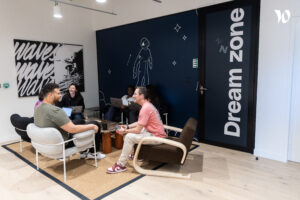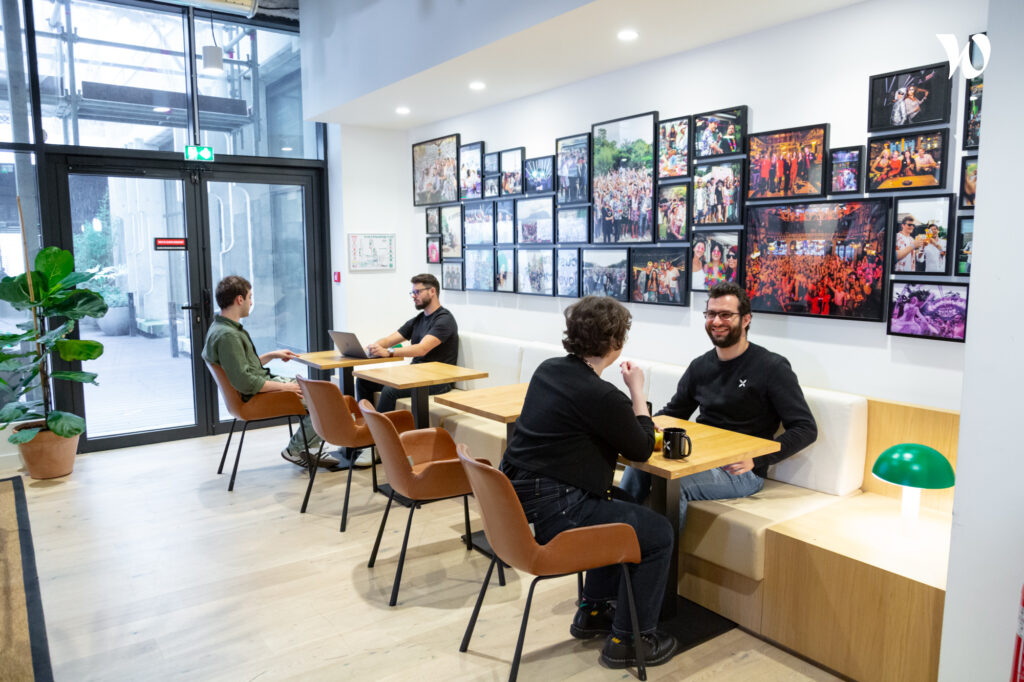5 min. read
How to Create an Effective Interview Process
Advice from Marjorie Boruel, Talent Acquisition Director at Qonto
Meet the Expert
Marjorie Boruel is the Talent Acquisition Director at Qonto, a European scaleup launched in 2017 that makes day-to-day banking easier for half a million SMEs and freelancers. Qonto offers an online business account combined with invoicing, bookkeeping, and spend management tools. The company has grown to over 1,600 employees spread across 5 offices.
Marjorie began her career at Qonto as a recruiter more than 5 years ago. Today, she oversees a broad scope of people-centric functions including recruitment, internal communications, employer branding, diversity, equity & inclusion (DEI), and knowledge management. Her role is focused on attracting top talent, fostering an inclusive and engaging workplace, and enabling employees to thrive and grow their careers at Qonto.
What are the key elements of an effective interview process?
An effective interview process begins with a thorough understanding of the needs and the problems that hiring someone for a team will solve.
This is why a good recruiter is, first and foremost, an HR person.
This means they understand the business and know how to address challenges by creating an efficient organization. It involves knowing the people well to grasp the culture and context and to hire individuals who not only fit perfectly but also add value. Additionally, a recruiter knows exactly what is happening externally and can guide the manager to ensure that who they want exists on the market. If you possess these qualities, then you can fully leverage this initial and most important step, which we refer to as the kickoff meeting.
During this step, we will first define our needs, then determine how to find and assess the right candidate, and finally decide who should be involved in the recruitment process. These three questions—What, How, and Who—are essential and strategic. Once this is done, it is time to consider the kind of experience we want our candidates to have.
It should reflect our culture and, regardless of the outcome, encourage positive discourse about the company. This means combining both quality and speed.
What advice would you give to companies that are in the early stages of setting up their interview process?
The interview process must reflect the company’s culture and be designed to help candidates make quick, regret-free decisions while guiding the interviewer to determine if the candidate can solve our problems and/or improve the situation.
This means that each step should be distinct to cover all the points we need to assess and to provide all the necessary information to the candidates.
To achieve this, it is crucial at the kickoff to clearly define what we need to assess and why, identify the checkpoints, and determine who will do what. Additionally, effective communication supported by robust tools is key to ensuring that each interviewer has the right information on time and does not miss the opportunity to assess new things at each step.

How do you achieve a standardised process across the organisation and departments?
We establish a standardized process by explaining the objectives of each step and how they are connected.
We share this information during the onboarding of each manager, and for every search, a recruiter is always involved to support the hiring manager and ensure the quality of the process.
However, we view it not just as a process, but more as a standard. This means we can modify or adapt it depending on the situation.
For instance, it is not mandatory for the team to meet the candidate, but we can add this step if the candidate needs more information or wants to spend more time understanding the culture and assessing their fit with the team.
What are your best practices for continuously improving the interview process?
We always strive to continuously improve, as with everything we do at Qonto. To achieve this, we gather feedback from our candidates through surveys and monitor their satisfaction. Since we establish a strong relationship based on trust with them, it is quite easy and smooth to obtain their feedback, and we do not hesitate to ask for it, notably on Glassdoor. Additionally, with our ATS, we can send automatic surveys.
We can also leverage other KPIs such as conversion rate and time to fill, which reflect the quality and effectiveness of our process.
For recurring searches, for instance, we have specific rituals to foster innovation by identifying potential areas of improvement, testing ideas, and monitoring the results. We run this in partnership with recruiters and hiring managers. Last but not least, our hiring managers are also considered our clients, so their feedback is important to us. Moreover, they all come from different environments, which provides us with the opportunity to be inspired by other companies and their best practices.

How do you handle situations where there is a disagreement among interviewers about a candidateʼs suitability?
We start the process with a robust kickoff, and the deliverable is a persona.
This persona serves as our tool for alignment because it ensures that all interviewers are on the same page regarding the needs, the required skills, and the criteria and control points. If an interviewer disagrees, the recruiter is responsible for creating alignment by referring to the persona and considering the feedback.
By being disciplined and rigorous, we are more efficient and create trust among all the interviewers. It is important to acknowledge that we have a limited control zone because hiring is not an exact science. Therefore, our goal is to excel within our control zone and do whatever we can in this area.
For instance, it is up to us to ensure that no candidate is left without an answer or feedback, and to prepare thoroughly the questions we want to ask for each specific skill we aim to assess.

Which resources (books, courses, workshops) do you recommend?
I enjoy Robin Choyʼs podcast, but I also like listening to podcasts and reading books on various topics, not just about hiring.
I believe that a good recruiter needs to understand the business and the world around it to effectively connect the dots.
For instance, at Qonto, we have built our culture around lean principles, and each new manager receives the book “Learning to Scaleˮ during their onboarding. I really appreciate this because it helps combat misconceptions and avoid common mistakes. I am also passionate about neuroscience, so I love the book “Your Brain at Work“. It has helped me better understand my reactions and those of others, and I feel that by understanding myself, I can be more efficient and also create the right conditions to be fulfilled at work.

What role does technology play in your interview process? What tools do you find most useful?
As mentioned above, it is crucial to support your vision and standards with tools.
The fundamental one for a recruiter is a robust ATS (Applicant Tracking System).
This benefits the enhancement of the candidate experience by ensuring good communication between interviewers and maintaining a history (while respecting privacy and protecting data) to build relationships with candidates. Additionally, tools can help improve your efficiency by automating recurring tasks, for example, or by speeding up processes with Gen-AI, such as improving job ads, transcribing interviews, and analyzing data.

About Qonto
Qonto is the leading European business finance solution. It simplifies everything from everyday banking and financing, to bookkeeping and spend management. Qonto energizes SMEs and freelancers so that they can achieve more.
HQ: Paris, Île-de-France
Founded: 2017 by Alexandre Prot (CEO) and Steve Anavi (President)
€622m raised with VCs and business angels including Valar, Alven, the European Investment Bank, Tencent, DST Global, Tiger Global, TCV, Alkeon, Eurazeo, KKR, Insight Partners, Exor Seeds and Gaingels.







